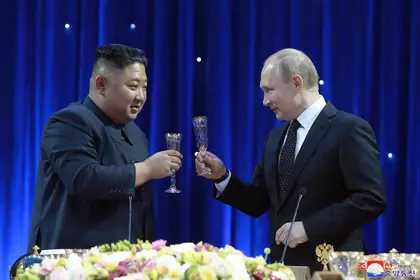The Kremlin is facing increasing criticism from Russian milbloggers over a lack of artillery ammunition, as a British think tank said President Putin’s courting of North Korea to gain more military supplies is a sign of “desperation.”
As Ukrainian forces’ counteroffensive advances, Moscow is growing more desperate to trade its technology for North Korean ammunition, experts at the UK think-tank Chatham House said.
- Check the most up-to-date Ukraine news reports from today.
- See the most contemporary Ukraine news reports for today.
JOIN US ON TELEGRAM
Follow our coverage of the war on the @Kyivpost_official.
“Ukraine has made significant progress and reached Russia's main defensive line in the south. This is therefore both a desperate and a logical move by Russia,” James Nixey, the director of the Russia and Eurasia program at Chatham House said in a press release.
Recent comments from Russian milbloggers also suggest the Kremlin’s ammo situation at the front is bleak.
In a post on Telegram, one prominent commentator said Russia’s forces are increasingly having to rely on Lancet drones and 220mm and 300mm rounds for Multiple Launch Rocket Systems (MLRS), both of which are available in limited quantities.
The Institute for the Study of War in its latest daily assessment, wrote: “Russian sources continue to complain that Russian forces lack sufficient counterbattery capabilities and artillery munitions in the face of ongoing Ukrainian counteroffensive activities, which the Kremlin and the Russian Ministry of Defense (MoD) are reportedly attempting to combat.

Putin and Xi Praise Ties, Hours After Trump Sworn In
Moscow now appears to be turning to North Korea to help solve the problem.
“One should be wary of falsely connecting cause and effect, but this weapons-for-tech (and money) exchange between Moscow and Pyongyang comes as the Russians are being pushed back in the counter-offensive,” Nixey said.
After weeks of mine clearance – Ukrainian forces broke through Russia’s first line of defense in the Zaporizhzhia region, Brig Gen Oleksandr Tarnavskiy told British media on Saturday, Sept. 2.
On Tuesday, Sept. 5, Ukrainian forces continued their advance south of the strategically important village of Robotyne – which they liberated on Aug. 28.
Tarnavskiy estimated that Russia had devoted 60 percent of its time and resources to building the first defensive line and likely only 20 percent to its second and third lines.
Nixey’s comments follow news that North Korean leader Kim Jong Un was planning to meet Russian President Vladimir Putin in Russia.
“Just as you can tell a person by their friends, you can tell a country by the company it keeps. In Russia's case, that company now consists largely of fellow rogue states,” Chatham House Senior Consulting Fellow Keir Giles said in the press release.
“China's reluctance to overtly supply Russia with serious and/or voluminous offensive weaponry leaves Russia with three primary options: indigenous production, Iran, and North Korea,” Nixey said.
According to The New York Times, Kim would come to Russia seeking advanced technology for satellites and nuclear-powered submarines as well as food aid for his impoverished nation.
“And Russia wants what North Korea has – vast stockpiles of the ammunition Russia has been burning through in its colonial war of reconquest at the other end of the country seven time zones away,” Giles said.
“Russia's past involvement in setting up a UN sanctions regime on [North Korea] is irrelevant. Such contradictions are no problem for Russia in peacetime, let alone wartime,” Nixey said.
Although he’s announced plans to visit China in October, Putin has not traveled abroad – apart from Russian-occupied parts of Ukraine – since his arrest warrant following an International Criminal Court ruling in March.
However, world leaders have been traveling to Russia.
Turkish President Recep Tayyip Erdogan visited Putin in Sochi, Russia on Monday, Sept. 4 in an attempt to revive a Ukrainian grain export agreement.
Kim would likely visit the far-eastern Russian city of Vladivostok to attend Russia’s Eastern Economic Forum, which is scheduled to run Sept. 10 to 13.
You can also highlight the text and press Ctrl + Enter










